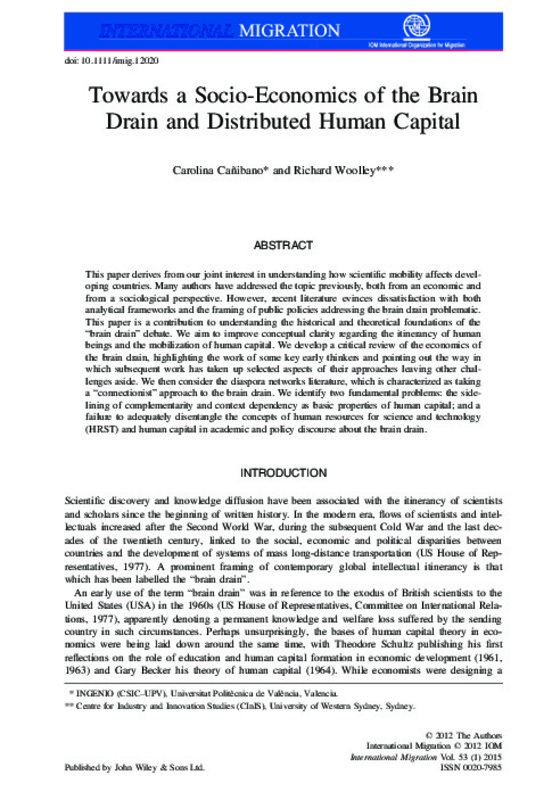JavaScript is disabled for your browser. Some features of this site may not work without it.
Buscar en RiuNet
Listar
Mi cuenta
Estadísticas
Ayuda RiuNet
Admin. UPV
Toward a socio-economics of the brain drain and distributed human capital
Mostrar el registro sencillo del ítem
Ficheros en el ítem
| dc.contributor.author | Cañibano Sánchez, Carolina
|
es_ES |
| dc.contributor.author | Woolley, Richard Derle
|
es_ES |
| dc.date.accessioned | 2016-09-15T11:10:27Z | |
| dc.date.available | 2016-09-15T11:10:27Z | |
| dc.date.issued | 2015-02 | |
| dc.identifier.issn | 0020-7985 | |
| dc.identifier.uri | http://hdl.handle.net/10251/69740 | |
| dc.description.abstract | [EN] This paper derives from our joint interest in understanding how scientific mobility affects developing countries. Many authors have addressed the topic previously, both from an economic and from a sociological perspective. However, recent literature evinces dissatisfaction with both analytical frameworks and the framing of public policies addressing the brain drain problematic. This paper is a contribution to understanding the historical and theoretical foundations of the “brain drain” debate. We aim to improve conceptual clarity regarding the itinerancy of human beings and the mobilization of human capital. We develop a critical review of the economics of the brain drain, highlighting the work of some key early thinkers and pointing out the way in which subsequent work has taken up selected aspects of their approaches leaving other challenges aside. We then consider the diaspora networks literature, which is characterized as taking a “connectionist” approach to the brain drain. We identify two fundamental problems: the sidelining of complementarity and context dependency as basic properties of human capital; and a failure to adequately disentangle the concepts of human resources for science and technology (HRST) and human capital in academic and policy discourse about the brain drain. | es_ES |
| dc.description.sponsorship | Preliminary versions of this paper were presented at the International Workshop “Mobility, Science and Culture” (Braga, February 2010), the 8th GLOBELICS International Conference (Kuala Lumpur, November 2010) and the Macquarie University Skilled Labour and Migration Group (Sydney, November 2010). The authors would like to thank the colleagues and discussants that provided feedback in these fora. In particular, they are grateful to Claudia de Fuentes and to Jordi Molas for their careful reading of the draft and their useful comments. The authors were grateful recipients of funding from the International Science Linkages Program of the Academy of the Social Sciences in Australia and the Australian Department of Industry, Science and Research, which directly supported this work. | |
| dc.language | Inglés | es_ES |
| dc.publisher | Wiley | es_ES |
| dc.relation.ispartof | International Migration | es_ES |
| dc.rights | Reserva de todos los derechos | es_ES |
| dc.title | Toward a socio-economics of the brain drain and distributed human capital | es_ES |
| dc.type | Artículo | es_ES |
| dc.identifier.doi | 10.1111/imig.12020 | |
| dc.rights.accessRights | Abierto | es_ES |
| dc.contributor.affiliation | Universitat Politècnica de València. Instituto de Gestión de la Innovación y del Conocimiento - Institut de Gestió de la Innovació i del Coneixement | es_ES |
| dc.description.bibliographicCitation | Cañibano Sánchez, C.; Woolley, RD. (2015). Toward a socio-economics of the brain drain and distributed human capital. International Migration. 53(1):115-130. https://doi.org/10.1111/imig.12020 | es_ES |
| dc.description.accrualMethod | S | es_ES |
| dc.relation.publisherversion | http://dx.doi.org/10.1111/imig.12020 | es_ES |
| dc.description.upvformatpinicio | 115 | es_ES |
| dc.description.upvformatpfin | 130 | es_ES |
| dc.type.version | info:eu-repo/semantics/publishedVersion | es_ES |
| dc.description.volume | 53 | es_ES |
| dc.description.issue | 1 | es_ES |
| dc.relation.senia | 283533 | es_ES |
| dc.contributor.funder | Academy of the Social Science in Australia | |
| dc.contributor.funder | Department of Industry, Innovation and Science, Australian Government |








